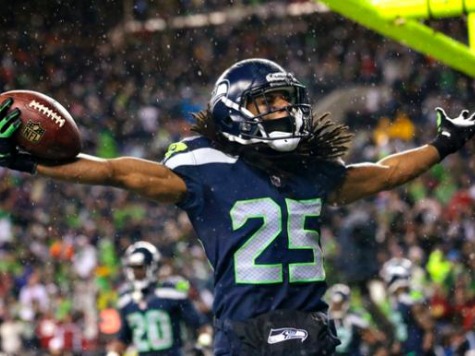Seattle Seahawks cornerback Richard Sherman argued this week that the NFL is a violent game and that efforts to make it less so will lead to even more indecision among defenders, making them more vulnerable to injury.
Sherman’s message was simply: “If you don’t like it, stop watching.”
Writing at MMQB, Sherman described the first time he got a concussion in an NFL game and how he stayed in the game, played half-blind, and snagged his first career interception:
On the game’s seventh play, I trailed my receiver down the left sideline and looked back to see Andy Dalton toss it underneath to Chris Pressley, their 260-pound fullback. As he turned up the sideline I came down hard, squared up, and dove at his legs. His right knee connected with my temple, flipping him over my head. I got up quickly and shook my head back and forth to let them know nobody is running me over. The problem was that I couldn’t see. The concussion blurred my vision and I played the next two quarters half-blind, but there was no way I was coming off the field with so much at stake. It paid off: Just as my head was clearing, Andy Dalton lobbed one up to rookie A.J. Green and I came down with my first career interception. The Legion of Boom was born.
“That was the second and last time I’ve had a concussion, mainly because I don’t make a habit of leading with my head,” he writes before saying, “the NFL is the problem.”
The fiery cornerback out of Stanford who is arguably the league’s best player at the position lamented the “public ire” that has caused the NFL to say, “Hey look, we care”:
A NASCAR driver understands that anything can happen during a race; his car could flip at 200 miles per hour. A boxer knows when he goes in the ring what’s happening to his body. Just like them, we understand this is a dangerous game with consequences not just in the short term, but for the rest of our lives. All of us NFL players, from wide receivers to defensive backs, chose this profession. Concussions are going to happen to cornerbacks who go low and lead with their shoulders, wide receivers who duck into contact, safeties who tackle high and linemen who run into somebody on every single play. Sometimes players get knocked out and their concussions make news, but more often it’s a scenario like mine, where the player walks away from a hit and plays woozy or blind. Sometimes I can tell when a guy is concussed during a game–he can’t remember things or he keeps asking the same questions over and over–but I’m not going to take his health into my hands and tell anybody, because playing with injuries is a risk that guys are willing to take.
Like boxers, Sherman, who is never afraid to speak his mind, says today’s NFL players are aware of the risks, especially after more information about head injuries that have come to light in recent years.
“Today, we’re fully educating guys on the risks and we’re still playing. We have not hidden from the facts,” he writes. “That’s why a lot of guys get frustrated with these fines and penalties, especially for the defenseless receiver rule. Nobody who chooses to play this sport should be described as defenseless. There’s nothing we can do about it, unless you want us to just wait until these guys catch the ball and then let them come down and we tackle them.”
He also wrote that “defensive players are used to playing fast, but now they’re being forced to play with indecision, and indecision gets you hurt in this game.”
He continued:
People are always going to play football, and if higher income families choose to pull their kids out of the sport, it will only broaden the talent pool, giving underprivileged kids more opportunities to make college rosters. Most of the top guys in this league come from underprivileged situations anyway.
And that’s not to say most of us chose football for money. I played at 5 years old because it was fun. You meet all of your friends, you learn about teamwork, camaraderie, discipline, following directions, how to time manage and how to rely on other people. Do I think about the consequences 30 years down the line? No more than I think about the food I’m enjoying today, which could be revealed in 30 years to cause cancer or a heart murmur or something else unpredictable.

COMMENTS
Please let us know if you're having issues with commenting.